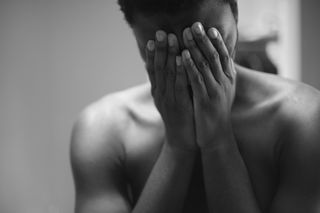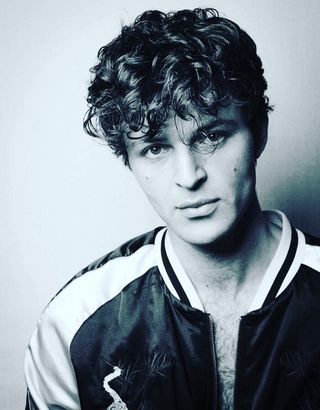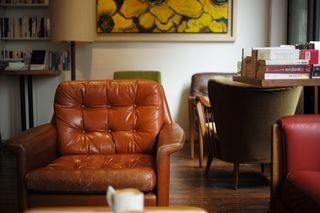Health
Should Gay Men Start Therapy?
Billboard's hottest new artist gets real about therapy and gay men.
Posted April 9, 2018

There's a silent epidemic going on. Millions of men are walking around with significant mental health issues but receive no treatment or support. Recent research suggests over 31% of men have had depression at some point in their life but only 1 in 4 will seek treatment. There is no group of men with more mental health risks than gay men-anxiety, depression, and substance use disorders are nearly twice as common among gay men compared their straight peers. How does this impact the lives of gay men? According to the CDC and other national health organizations, men are nearly four times as likely to commit suicide than women. Gay teens are five times as likely to attempt suicide than their heterosexual counterparts.
Natti Vogel refuses to keep this epidemic silent. A singer-songwriter based in Brooklyn, Natti has spent a majority of his career creating music and art from a queer perspective including the mental health struggles of his gay peers. His latest music video for the single "Brown Rice" (off his new album, Serving Body) has been met with a lot of attention for its unflinching portrayal of mental health issues including body image, eating disorders, and substance abuse among gay men in complex relationships. It has also garnered attention for its star, Matt Wilkas, of kissing-your-Olympian-boyfriend-at-the-Olympics fame.

Watching Vogel's video, which premiered on Billboard Pride and listening to his music, I found a lot of the themes and issues I encounter in my therapeutic work with gay men and boys. I decided to invite Natti to an interview about what he thinks about what therapy might offer gay men and boys.
Here's what the award-winning artist has to share about therapy, therapists, and what it has to offer gay men and boys.
What are the reasons you think gay men and boys should go to therapy?
If you’re a gay man reading this, you’ve been through some shit that only gay men have been through. Whether you’ve been out and proud on the battlefield or repressed on the sidelines, you have anxieties and complexes that straight people could never dream of! And you deserve to stop time and space in a consistent, safe room 1–on-1 to investigate it all and make life more intentional and rewarding.
What brought you to therapy?
I got into therapy only a couple years back because an older friend swore by it and helped me find a sliding-scale institute (it was super cheap and I was even broker than I am now! )
How has therapy helped you generally?
I was skeptical AF until a few months in, I started realizing I had emotions (wow!) and that I could start to be on my own team (yay!) When I decided to stick with therapy, it was the first time I could line up the dots and begin to see how all the shit I was put through growing up (that I used to dismiss, and actually sometimes still dismiss lol I’m trying) is affecting my present-day life in a way-too-real way. As more bullshit gets revealed, I get less freaked out because I know its emergence signals an opportunity for me to exhume it. Therapy helps me exhume bullshit.
What are some things you learned from therapy that has helped your career?
I’ve learned that being an artist and being gay doesn’t mean I have to be treated like shit, not by energy vampires with victim complexes, not by pervy people with power, not by un-empathic straight people, not by anyone at all, really! It’s funny, I initially slept on therapy because I thought it would break the bank and distract me from my career, but the *opposite* has happened: you’d be surprised at how much good can come your way when you can begin to feel deserving of goodness.
What are some things from therapy that has helped your relationships and life satisfaction?
I think my closest friends know how relentlessly hard I am on myself. I think they are honestly super relieved to see me stop waging war on myself just a little bit. Some relationships have been challenged, too, because a stronger, more self-assured Natti is not for everyone, apparently.
What do you want gay men and boys to know about how therapy really is compared what they might have heard?
FIRST of all: "gay conversion therapy" is NOT therapy. The term itself is #fakenews because therapy is the opposite of conversion! Good therapy is about becoming more of who you are, not less. A good therapist is kind and genuine, being real with you but not manipulative or dismissing you as a stereotype-think Denise Dowse from HBO's "Insecure" NOT Catherine Keener from "Get Out." Nobody wants any of that sunken place terror-hypnosis! The straight white cis male agenda is aggressive, and we have had heterosexuality pummeled down our throats since day one. And we still get told we're being too much just by daring to be honest. I mean, they still give the best gay roles in Hollywood to straight people! in 2018! (#straightwashing) Therapy should be a safe haven to begin to dream of expecting more from life than society says you're worth.

What advice do you have for gay men and boys still on the fence about starting therapy? We gay men were born into a world that was not safe for us to be ourselves in. Period. Let's heal from that and go back to battle stronger. "It gets better" is bullshit: we actively *make* it get better if we choose.
What advice do you have for therapists working with gay men and boys?
We have the most fun coping mechanisms! We are witty, funny, sexy and fabulous as hell! Don't get jealous, but also seriously: don't let yourself be too entertained by our charming defenses and get distracted from the fact that we need healing, too, girl. Too many gay men become fabulous accessories for straight people without evening noticing that it's happening, so exercise the maturity and integrity to not fall into that dynamic.
What should therapists be sensitive or aware of in working with men like the protagonist, Brady, in the “Brown Rice” video?
Don't get caught up in checking for the laundry list of gay demons: whether your patient is reckless (like Brady) or hyper-conscientious, our emotional core is still searching, still vulnerable, still lost in a hall of mirrors, and you should be attuned to that whether we're struggling with meth addiction or just trying to navigate a difficult relationship.
Don't assume that a stated goal of treatment should remain constant, because gay men are navigating new and contradictory societal expectations that can leave us feeling adrift, gaslit, numb, etc.
If you're struggling with mental health issues, relationship issues, or just want to see what you can get from therapy, consider reaching out to an LGBTQ medical provider. You can also find more resources for gay supportive therapy at:
National Alliance on Mental Illness
The Trevor Project Help Line- 866-488-7386
Mental Health Crisis Text Line: Text “home” to 741741
William Alanson White Institute- LGBT Service
Check out the full Brown Rice Video Below:




